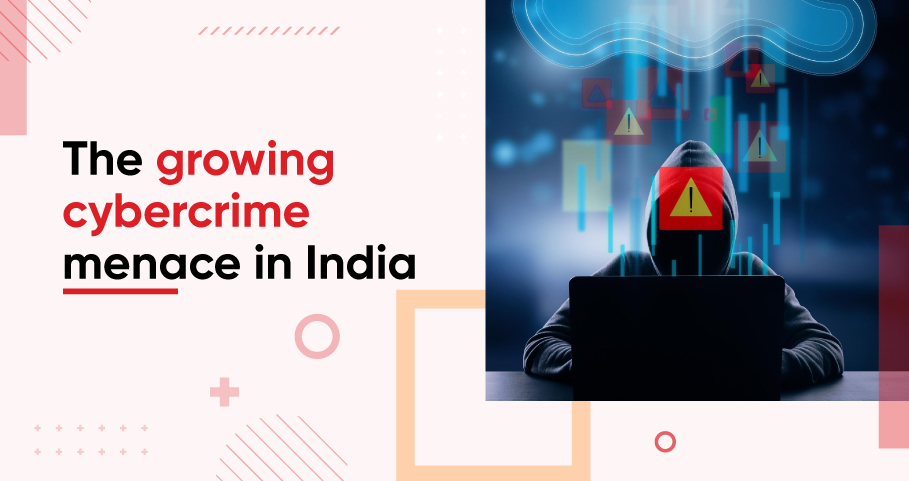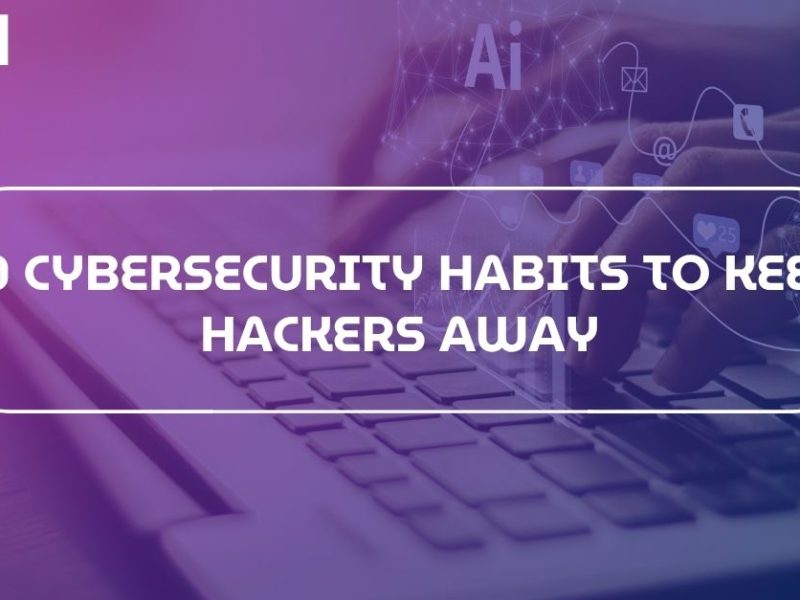
Growing cybercrime in India and the growth of AI technology
Cybersecurity and data security are crucial in today’s digital era, as they safeguard personal and professional information. Insider threats like data theft are also a serious concern, and adhering to security policies, procedures, and legal requirements are essential. The increasing reliance on technology and the interconnectedness of devices and systems has brought about new cybersecurity risks and challenges.
As organizations embrace digital technologies to drive innovation, efficiency, and growth, cybercriminals are ramping up their efforts to exploit vulnerabilities in these systems. Indian businesses are facing cybersecurity challenges such as ransomware, data leaks, phishing, and malware attacks. Emerging technologies like cloud-native platforms, AI, ML, and Quantum Computing (QC) are gaining traction in the market. Cybersecurity is a complex and ever-evolving field, and there is no silver bullet that will completely protect us from cyberattacks. However, investing in cybersecurity and being aware of the risks can reduce your vulnerability to these attacks.
The rise of cloud computing, AI and ML, mobile devices, and the Internet of Things (IoT) has further expanded the attack surface, making it more challenging to secure digital assets and data.
71% of cybersecurity experts believe they are losing the battle against online thieves. Cybercriminals now have a variety of access points for attacking businesses due to the increased endpoint count and expanding attack surface. In Q1 2023, they were subjected to more than 2,000 weekly attacks, a rise of 18% from the previous year.
As enterprises embrace cutting-edge technologies like AU/ML, distributed cloud, and 56 to reduce and tackle these dangers, the cybersecurity market in India is anticipated to develop at a CAGR of 13.37% from 2022 to 2027 and reach USD 317.02 billion by that year. Businesses are employing these technologies to create security solutions to stop, identify, and react to cyberattacks in real-time by analyzing massive amounts of data and identifying patterns that are difficult for humans to notice.
The significance of cybersecurity has increased significantly in recent years, necessitating organizations to invest in robust measures to protect their networks, systems, and data from potential threats. These measures include access controls, Total Security software, firewalls, encryption, real-time threat detection, and regular security assessments to identify vulnerabilities and strengthen defenses.
Indian cybersecurity market development
India has had a tremendous increase in Internet penetration over the past ten years. More than 700 million people in India use smartphones, and they are more technologically proficient than ever.
Although many people in India and around the world view cybersecurity as a niche industry, it is rapidly growing into one of the most vital, extensive, and essential security solutions, paving the way for a more secure and reliable future in everything online.
Indian businesses are undergoing significant transformation, but they still face challenges in cybersecurity. They face constant threats of data theft, a lack of skilled personnel, and inadequate resources to defend against cyberattacks. Low budgets make them easy targets for cybercriminals and malware. The tech-centric nature of businesses increases the vulnerability of large databases stored on servers.
The digitalization explosion and dynamic nature of the cyber world further complicate cybersecurity issues. Insufficient SOC resources, a lack of awareness, the increasing sophistication of cyberattacks, and potential threats like phishing and malware are the primary concerns. To enhance their security posture Total Security by Protegent are among the best cybersecurity solutions giving businesses the security they seek to safeguard their internal system from online threats.
There are possible dangers associated with the expanding usage of developing technology.
In terms of volume, data storage, cloud transformation, ease of accessibility through various servers, or ensuring the safety of the data, emerging technology is a field that offers remarkable new-age technologies and aids in the upskilling of Indian organizations and industries. The technology and open source of the networks that one works on further raise the threat to data in various ways, such as ransomware, malware, data theft, etc. The majority of Indian business executives—roughly 77 percent—agree that cybercrime is the biggest threat to their companies, while 62 percent consider internal threats to be a serious issue.
Secondly, ChatGPT is an effective language model that has recently generated a lot of discussion. It can be used to generate dangerous codes like evasive malware, ransomware, or phishing email campaigns, which can be used to undermine cybersecurity. It can also be used to construct code, procedures, guided investigations, and plans that can help address such threats. Threat actors may use ChatGPT Al engines to build sophisticated threats with enormous potential for impact.
India is enhancing its capacity for cybersecurity.
The cybersecurity landscape in India has quickly changed to keep up with aspirations to use the cloud and go digital. A thorough security strategy and security platforms that develop at the same rate as cyber threats are already in high demand from both private and public sector enterprises. In order to spot threats in real time, businesses must simultaneously invest in cutting-edge security systems like Protegent Total Security Software. A governing body must oversee the cybersecurity movement. To safeguard their data from all viruses and spam, Indian firms must build cloud infrastructure like the hybrid multi-cloud for storing massive datasets.
In the past six months, a business in India has experienced an average of 1787 attacks per week, compared to 983 attacks per organization globally, according to the Check Point Threat Intelligence Report. As the globe undergoes the fifth generation of cyberattacks, which consist of massive, multi-vectored attacks aimed at individuals, corporations, and nations.
Data overload is one of the greatest issues Indian businesses are dealing with. As a result, monitoring cloud security has become challenging, and fundamental security measures are no longer necessary due to the rise in sophisticated assaults. Concerns about data loss and leakage, data privacy, and lack of visibility have seen a rise.
While cybersecurity is important for all businesses, the potential for growth is greatest in those that have undergone rapid change as a result of digital disruption. To protect their data business are facing security software. India’s first criminal investigation organization, the Cyber Criminal Emergency Response Team (CERT), handles cybercrime-related cases, gathers digital evidence, and develops innovative investigative techniques to crack cases involving organized crime and high-profile crimes.
Significant security risks for 2023
The increase in phishing assaults would be the largest obstacle. Cybercriminals have been employing new methods and techniques to send phishing emails in recent years, particularly frauds targeting CXO and CFO levels. Secondly, a lot of businesses have either begun or finished their transition to the cloud. These hackers are currently focusing on the private information kept in the cloud. Thus, the importance of cloud security has increased. Thirdly, as the majority of businesses today operate in a hybrid mode, hackers can simply breach endpoint security systems and gain access to corporate networks.
Increasing the organization’s security level
Information security cannot limit the expansion of a company. There is a very fine line to walk when it comes to the information national security system department becoming a business. We must inform management of the security concerns and work to reduce them without jeopardizing company development.
The top-down strategy is the most crucial component. Everyone should be made aware that information security is everyone’s duty, not just of the top management. One strategy that might be advantageous to the corporation as a whole is this one.
Attacks against cybersecurity will still exist in 2023. In actuality, they are getting more advanced and precise than ever. Numerous factors, including the sophistication of cybercriminals and the security of cyberspace, contribute to this. The 290% increase in cyberattacks only seems insignificant in comparison to the growing and impending threat India has yet to face.
India needs a secure internet that all members of society, regardless of age, can access. The goal of the Digital India Bill is to update antiquated legislation, advance digital inclusion, and provide a safe online environment for India’s fast-expanding internet user population.
With every passing day, malicious actors are devising new and sophisticated ways to compromise our online security and steal sensitive information. It’s imperative for individuals and organizations to stay one step ahead of cybercriminals, and that’s where Protegent Total Security steps in as a formidable ally.
Protegent Total Security is a robust cybersecurity solution designed to combat cybercrime on multiple fronts. It offers a comprehensive suite of tools and features that work in synergy to safeguard your digital world. Here’s how Protegent Total Security plays a pivotal role in the battle against cybercrime:
Advanced Antivirus Protection: Protegent’s cutting-edge antivirus technology detects and eliminates a wide range of malware, including viruses, Trojans, worms, and spyware, preventing them from infecting your devices.
Real-time Threat Detection: The software employs real-time monitoring to identify and thwart emerging threats before they can cause harm. This proactive approach ensures your systems are continually shielded.
Firewall Security: Protegent’s robust firewall safeguards your network and prevents unauthorized access, effectively barricading cybercriminals from exploiting vulnerabilities.
Data Encryption: It offers data encryption capabilities to protect sensitive information, ensuring that even if it falls into the wrong hands, it remains unreadable.
Internet Security: Protegent Total Security includes features like web filtering and phishing protection, reducing the risk of falling victim to fraudulent websites and email scams.
Regular Updates: The software is regularly updated to stay ahead of evolving threats, ensuring that your defenses remain strong and effective.
Our economy is becoming more technologically intensive, and the ecosystem supporting innovation is expanding. However, the statute governing this industry is 22 years old.
In cybersecurity, artificial intelligence is quickly taking center stage. The most revolutionary technology of our time is called Al. It may be used to automate processes, spot hazards, and handle emergencies more quickly and skillfully than people. Cyberattacks are increasing in frequency and sophistication across all industries. Although AI is still a very young technology in cybersecurity, it has the power to completely change the industry. Organizations may better defend themselves against increasingly complex threats by automating tasks and enhancing threat detection and response with the aid of AI. It is capable of analyzing enormous volumes of data to spot trends, oddities, and signs of possible cyberthreats. In order to improve their detection skills, machine learning algorithms may continually learn from fresh data, which enables the quicker and more precise identification of possible security breaches.
Government agencies need to realize that they are the guardians of the public’s information and that security is their top priority. Government, public sector organizations, and corporations have a legal obligation.
Given the combination of low public knowledge of cybersecurity concerns and flaws in India’s security architecture, the country is also a suitable setting for hackers. The lack of cybersecurity knowledge among Indian consumers, businesses, and legislators makes them ideal targets for hackers, particularly given the paucity of cybersecurity measures in place to protect internet users. Al has the potential to drastically lower the cost of cybersecurity in the future by automating processes, increasing accuracy, and offering insights.
Al is a complicated technology, though, and it may be challenging to manage and execute. Before deciding whether to deploy AI, organizations should thoroughly weigh its advantages and disadvantages.
In an era where cyber threats continue to evolve, Protegent Total Security is your shield against the ever-present danger of cybercrime. By providing comprehensive protection, constant vigilance, and regular updates, it empowers individuals and organizations to navigate the digital landscape with confidence and peace of mind. Don’t wait until it’s too late—arm yourself with Protegent Total Security and fortify your defenses against cybercrime today.




